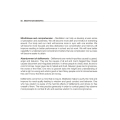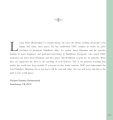Dhamma wisdom : ค้นหาหนังสือธรรมะ หน้า 6 / 10
หน้าหนังสือทั้งหมด

37
Practicing the Four Universal Forms of Benevolence
The Buddha answered this question in one word: benevolence. That is to say mutual benevolence, the practice the Four Universal Forms of Benevolence (Sāngahavatthu), promote happiness in living togethe
The Buddha highlighted benevolence as key to mutual happiness. The Four Universal Forms include: 1. Giving (Dāna) – sharing wealth and support fosters a positive atmosphere. 2. Pleasant Speech (Piyavā

52
Understanding the Noble Eightfold Path and Threefold Path in Buddhism
[Right concentration, again, becomes the basis of right views, right aspirations, and other steps of the noble eightfold path, which is now experienced on a higher level, and this spiral-like progress
This text elaborates on the interrelationship between Right Concentration, Right Views, and Right Aspirations as pivotal elements of the Noble Eightfold Path leading to liberation. It discusses the sp

5
Understanding Dhamma Through the Teachings of Luang Por Dattajevedo
This book is a translation into English of a lecture given by a Most Venerable Thai monk in his native tongue. In order to convey the content accurately and understandably to an international readersh
This book presents an English translation of a lecture by Luang Por Dattajevedo, a respected Thai monk, emphasizing the importance of ethical learning and teaching in understanding Dhamma. His charism

14
Wisdom Across Religions: An Interview with Luang Por
Interview
They all have the same goal. By using the TV program
we can learn much from the other religions and
incorporate the wisdom into our daily lives.
Luang Por Indeed, all the mainstream religion
In this enlightening interview, Luang Por discusses the commonalities among major religions and the importance of incorporating their wisdom into daily life. It marks Luang Por's first appearance on N

48
Raising Children: Cultivating Supreme Characteristics
Part Two: Raising Children
wisdom and moral training from their parents (Group
#4). Even though they may not be wealthy, these children
have the ability to develop into successful, wealthy and
moral a
In developing children into successful and moral adults, it is essential for parents to consider the qualities they want their children to possess. The text highlights three supreme characteristics: p

13
Pearls of Inner Wisdom: Our Only Real Belongings
12
Pearls of Inner Wisdom
2.Our Only Real Belongings
There are only two things
that really belong to us.
One is our mind
and the other is the point inside us
which is home to the mind.
Mind consists o
This text delves into the concept that our only true belongings are our mind and its inner home, referred to as the 'seventh base'. It explains the functions of the mind and emphasizes the importance

92
88 Meditation Benefits
88 MEDITATION BENEFITS
Mindfulness and comprehension – Meditation can help us develop a keen sense of perception and awareness. We will become more alert and mindful of everything around. Our body an
Meditation enhances mindfulness and comprehension, fostering perception and awareness. It aligns body and mind, leading to improved focus and memory, which results in better performance in academics a

45
The Teachings of the Buddha: Understanding Enlightenment
Suzanne Jeffrey
why we are here and where do we go after death. So, we have some questions regarding His life: for example, why did he spend six years in self-mortification? Is the number six signifi
In this teaching, Luang Por discusses the significance of the Buddha's life and his journey towards enlightenment. Born into wealth and possessing unique qualities, the Buddha sought wisdom from an ea

10
The Search for Knowledge and Freedom from Suffering
the day we lie on our deathbed, facing the reality of our mortal impermanence,
with all our fears returning to confront us once more.
Knowledge or wisdom that reveals the truth has and will always pr
When we confront our mortality, knowledge reveals truth and offers a path to peace. Ignorance leads to fear, prompting the pursuit of wisdom to alleviate suffering. We seek answers to life's fundament

40
Chaiboon's Journey to Dhamma through Meditation
Even during the early hours of the morning, at 3 a.m. when most of his friends slept, Chaiboon would wake up to meditate because of favourable silence, and his body had just enough rest. He would medi
Chaiboon, despite the early hour of 3 a.m., dedicates himself to meditation amidst the silence when his friends sleep. Initially, he meditates alone but invites close friends to join him at Wat P TANA

173
Luang Phaw Dhammajayo's Teachings on Buddhism and Inner Peace
Luang Phaw Dhammajayo is compassionate. He cares the others, wishing all people to be happy and attain inner peace. He has established DMC channel in which he gives teachings to propagate Buddhism dai
Luang Phaw Dhammajayo promotes compassion and the teachings of the Buddha through the DMC channel, guiding individuals towards inner peace and happiness. His approach emphasizes non-violence, making i

24
Dhamma for Laypersons and the Four Levels of Beauty
A person who has the Dhamma for Laypersons
(Gharāvās-dhamma) must display four regular habits:
1. Habit of Responsibility – Whatever the task at hand, he must do it to the best of his ability, in t
A person who follows the Dhamma for Laypersons exhibits four habits: responsibility, self-training, endurance, and sacrifice. These traits ensure self-reliance and leadership within families. In marri

11
The Teachings of Luang Por Dattajeevo
Suzanne Jeffrey
Life, of course, is not as neat as these teachings are laid out for you, and we do not always meet
life’s stresses, or sufferings, head-on with a Dhamma teaching. When I become frustr
Suzanne Jeffrey reflects on her journey of understanding Dhamma teachings through the wisdom of Luang Por Dattajeevo. She shares insights into dealing with life's challenges, the importance of mindful

23
The Path to Nibbana and the Challenges of Lay Life
dure six arduous years of self-mortification before discovering Niramisasukha. During this period, the Buddha came close to death more than once, but when he finally found true happiness, he chose to
After six years of self-mortification, the Buddha discovered Niramisasukha, close to death multiple times. He emphasized living by the Dhamma for true happiness, urging ordination to escape worldly po

28
The Rebirth of Tambadathika: A Lesson in Dhamma
28
OCTOBER
Kasiha Readam
After the discourse, Tambadathika accompanied Venerable Sariputta for some distance and then returned home. On his way home a cow (actually a demon in the guise of a cow) g
After the death of Tambadathika, who was gored by a demon disguised as a cow, the Buddha reveals his rebirth in the Tusita deva world. Despite a life of evil deeds, Tambadathika attained *anūṇa maha*

12
Dhamma for Laypersons: Building a Stable Family
Although the solution is not simple, that does not mean
there is no path to correct and prevent them from occurring. If
each person realizes what the heart of the family is and
everyone takes the best
The text discusses a method for fostering a stable family as taught by the Lord Buddha through 'Dhamma for Laypersons', which includes truthfulness (sacca), self-control (dama), endurance (khanti), an

192
Understanding Respect in Buddhism
be summed up in the following proverb: One rotten apple spoils
the whole barrel. If people think this way, they can harm
Buddhism unknowingly. This is certainly not the nature of a
Buddhist. Buddhists
The text illustrates the negative impact of generalizing about monks based on misconduct and emphasizes the importance of critical analysis as taught by the Buddha. It highlights a discussion between

194
Understanding Merit in Buddhism
should think in this way. As long as the monks do not seriously
break the monastic discipline, you should think that you are
giving alms to them to replenish their energy for Dhamma
study and meditati
This text emphasizes the importance of giving alms to monks to replenish their energy for Dhamma study and meditation. It advises that both givers and receivers gain merit. It discusses the impact of

12
The Purpose of Dhammakaya Temple
this mode of thought mankind creates many different types
of research. And, to our great disappointment, most fail to
have lasting success.
The Dhammakaya Temple was established with the
aim to make i
The Dhammakaya Temple aims to develop its members into good people through understanding the Dhamma. It has expanded globally, with an increasing number of visitors practicing to eliminate suffering a

185
Glossary of Dhamma Terms
Part Seven: Appendixes
Danamaya: see Dana
Dhamma: split into three main meanings: First: "Pure
Nature" within existence and our relationship to it; Second:
the teachings of how to get to our "Pure Nat
This appendix provides definitions for crucial terms related to Dhamma, including the meaning of Dhama, the significance of giving sermons, the process of forming right outlooks, and the concept of su
